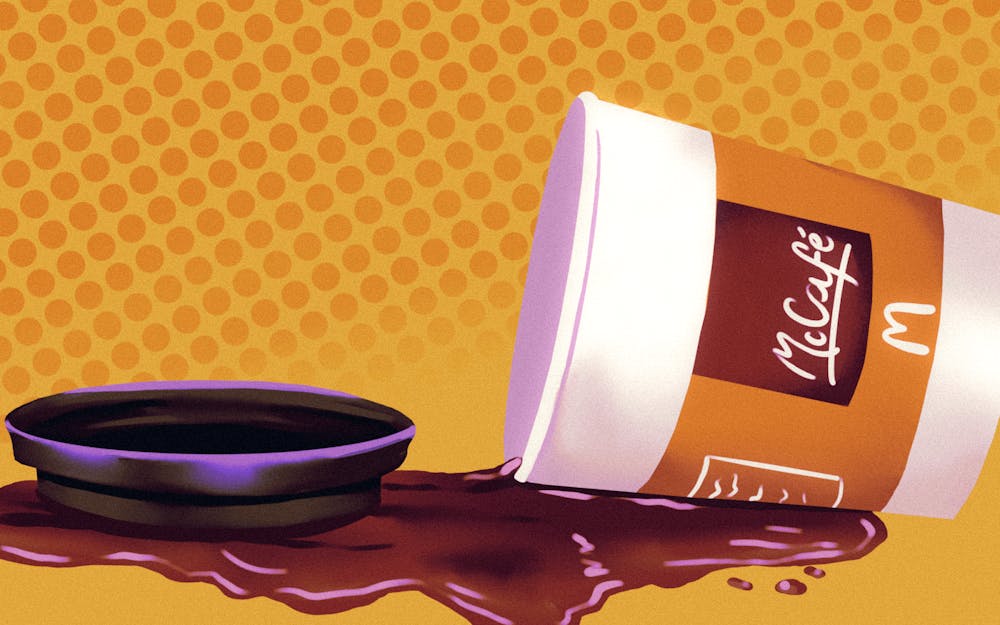In one of my classes the other day, the instructor and my classmates were chatting before class started. Somehow, the infamous “McDonald’s hot coffee case” came up in conversation. My instructor laughed off the case, remarking how stupid it was that someone could receive hundreds of thousands of dollars for simply spilling coffee on themselves.
I don’t fully blame her for thinking that way. Liebeck v. McDonald’s – commonly called the hot coffee case – is likely one of the most misunderstood legal cases in American history. The media storm that surrounded the 1994 case still influences people today. But nearly 30 years later, most still don’t know the true story behind it. It’s a tale of corporate greed, disastrous consequences and spilled coffee that’s still relevant to this day.
79-year-old Stella Liebeck was sitting in the passenger seat of her grandson’s car in 1992 when she spilled a hot cup of McDonald’s coffee on her lap. The scalding liquid caused third-degree burns over 16% of her body and forced her to get skin grafts.
[Related: OPINION: Billionaires will not save the media]
When Liebeck offered to settle the case with McDonald’s for $20,000 to cover her medical expenses, the company refused. They instead offered her $800.
Someone getting burned wasn’t new for McDonald’s. Over 700 other people had also been burned by their coffee, which the restaurants served at 180-190 degrees Fahrenheit. This temperature can cause third-degree burns within seconds.
Liebeck was ultimately awarded $160,000 and McDonald’s was fined $2.7 million, but the public response to Liebeck’s case was nothing short of defamatory. News sources across the nation painted her as greedy and twisted the facts of the case in a long game of telephone. McDonald’s themselves trivialized Liebeck’s case, making her seem less deserving of the retribution she deserved.
McDonald’s knowingly ruined lives with their coffee. It wasn’t that they didn’t know before Liebeck’s case. They just didn’t care. It didn’t hurt them enough financially or publicly to act, so they didn’t, even though they knew people would get hurt.
This case reminds me starkly of a current ongoing case: the recent East Palestine, Ohio train crash.
In a small town in Ohio, a Norfolk Southern train carrying toxic vinyl chloride derailed. The substance leaked from the derailed cars and crews ignited the chemical in an attempt to get rid of it, creating a dark cloud of smoke that spread across the area. Residents are now reporting harmful effects to themselves and the environment around them.
So what is Norfolk Southern offering the town of East Palestine and surrounding areas, which have likely been damaged for decades to come? $25,000. That’s around $5 for every resident. Though they claim this is simply an initial donation and more money is to come, I doubt that any more money will manifest until the town takes the company to court.
[Related: OPINION: There will never be freedom under capitalism]
Though these two incidents are at very different scales, they show a worrying connection. At the end of the day, corporations don’t care. Whether they burn 700 people or poison a whole town, as long as it doesn’t hurt their bottom line in any meaningful way, they turn a blind eye. They’ll offer meaningless amounts of cash, whether it be $800 or $25,000, knowing it ultimately won’t help.
Corporations don’t care about human beings; they care about profit. They control the narrative we see in the media, painting the victims as “irrational” and “greedy,” just like they did to Liebeck, who was in pain for the rest of her life due to the incident.
The story created by those corporations still lives on in our collective subconscious, whether or not we realize it. And we’ll continue to laugh off cases like Liebeck’s until something changes.
Danny William (they/them) is a freshman studying media.



